10 Best Learning Management Systems (LMS)

In the history of Learning Management Systems (LMS), looking back to 1924 takes us to the emergence of the first electronic teaching device created by Professor Sidney Pressey.
His mission? For teachers’ use in focusing on inspiring and thought-provoking tasks for students. And in almost 100 years, the priorities for learning and development are consistent with him. And the only distinction is the scale.
Today, there are 73.8 million people using learning management systems (LMS) in the world. Estimates suggest the LMS market could grow from somewhere around US$22 billion in 2023 to approximately US$52 billion in 2032. But with all of this growth in the market, it is still in line with what Professor Pressey wanted to accomplish, except multiplied in size.
In this article, we have included the 10 best learning management systems (LMS) for 2025 to discover a trusted platform that will advance employee engagement, enhance the learning experience, and support return on investment.
What is a learning management system?
A learning management system is either software or a cloud-based SaaS solution employed by organizations to plan, implement, and manage learning processes.
Although used to serve an organization’s specific eLearning needs, learning management systems (LMS) are an important principle in implementing learning strategies regardless of whether engagement with learners, employee retention, or developing skills to create future success are the focus.
An LMS is the most efficient way to manage online learning. It provides ways for L&D practitioners to generate more effective training courses and provides access to learners in a way that is more efficient than traditional learning alternatives.
By utilising and selecting the appropriate learning platform, you and your team will be able to see the value of an LMS through its learning cycle advantages, such as a more integrated approach to training, demonstrable tangible Return on Investment (ROI), or meaningful and efficient onboarding experience.
For organizations looking to maximize productivity alongside LMS adoption, you can explore the Great Online Tools to complement your training programs.
Why use an LMS platform?
The implementation of an LMS can vary sizeably depending on the organization, industry, and country. To provide evidence of the diversity of a learning solution, we have presented some of the most prevalent use cases for an LMS:
1. Employee onboarding: An LMS can automate the onboarding process in role-specific contexts, while also facilitating more engagement through blended and self-guided learning, making it an effective tool among modern learning management systems (LMS).
2. Compliance training: An LMS can automate compliance training, produce custom training programmes in minutes, collaborate with internal experts to co-create course content and foster completion rates.
3. Sales enablement: You and your team can elevate the sales team to greater heights by accelerating the onboarding process, levelling up their performance and skills gap equipping them in their workflow using Learning Management Systems (LMS).
4. Customer training: An LMS can help you and your team to produce customer training en masse, stop you from repeated tutorials or one-on-one training, and assist customers in maximizing their use of your products or services which they have already invested in.
The 10 Best Learning Management Systems
1. Absorb LMS
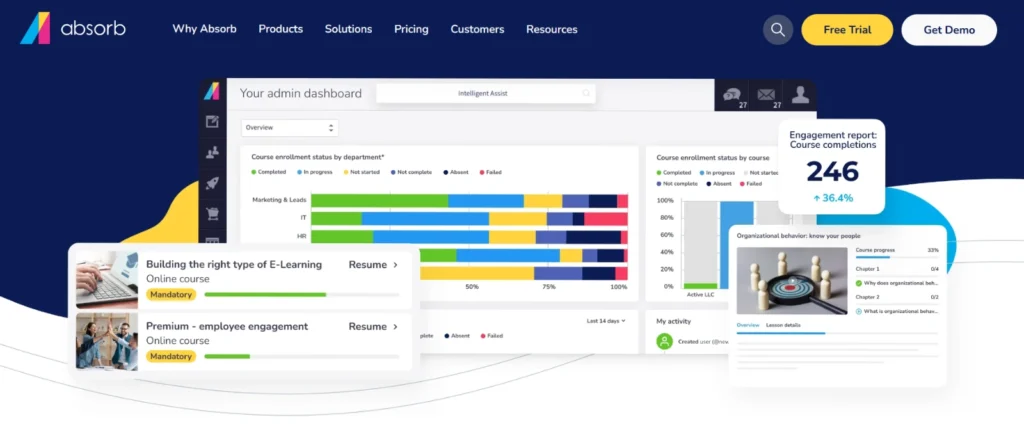
Absorb LMS is widely recognized as one of the top learning management software packages in India providing an easy, AI-powered learning solution for organizations from onboarding to upskilling. Their learning experiences are flexible, with less complexity in creating content, and they have access to customizable courses featuring advanced reporting, gamification, and microlearning to engage and track their team’s progress.
The dashboard meets 100% of the WCAG 2.0 standards, ensuring your online staff development needs are inclusive and effective , and fully supported by Learning Management Systems (LMS). You can also create custom learning experiences for teams, departments, partners and external learners.
Key Features:
- Customizable learning experience
- AI-assisted course creation
- Access to ready-made courses
- Reporting and analytics
- Gamification features & micro-learning elements
Pros:
- Ease of use – course creation using AI
- Gamification provides engaging features
- Robust analytics
Cons:
- Limited integrations
- Dashboard troubleshooting can be difficult
- Difficult to manage blended learning
Pricing:
- Custom
2. TalentLMS
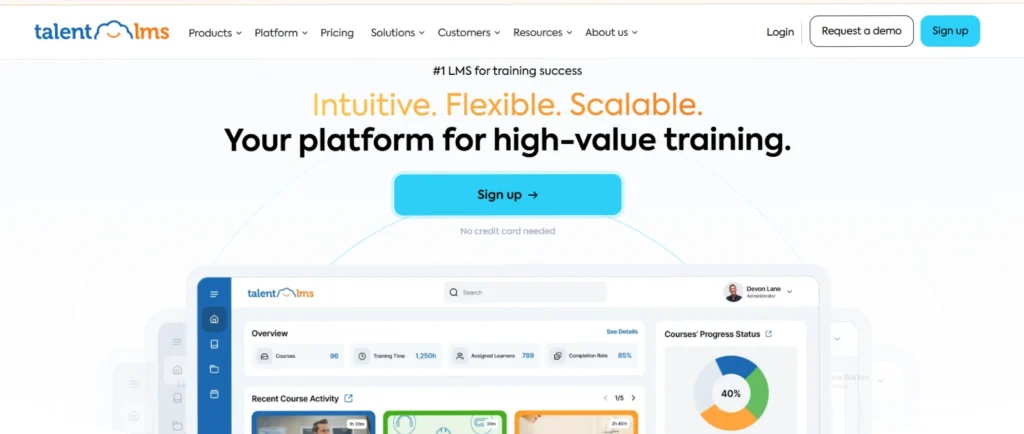
TalentLMS is yet another selection in the best learning management systems (LMS), alongside options like traineaze lms. TalentLMS is known for its simplicity in the user interface and ease of use, making it a great option for both small and large companies. TalentLMS enables users to upload all formats in a learning management setting including videos, documents, quizzes, and SCORM packages which allows for flexible and engaging learning experiences. It also offers gamification, enabling learners to stay engaged, as well as mobile capabilities so they can work on courses while on the go.
TalentLMS also creates a user-friendly experience for learners. With Learning Management Systems(LMS), your team members will see an overall snapshot of the courses they are engaged in and how much they have left to complete each.
Key Features:
- Gamification and multimedia integration
- Mobile access
- Support different content formats
Pros:
- Easy to use and intuitive
- A wide range of content types supported
- Affordable
Cons:
- Limited customization features
- Doesn’t have the advanced features you would find in complex training programs
- Could have challenges scaling for larger, more complex programs
Pricing:
- Starting at $69/month
3. Litmos
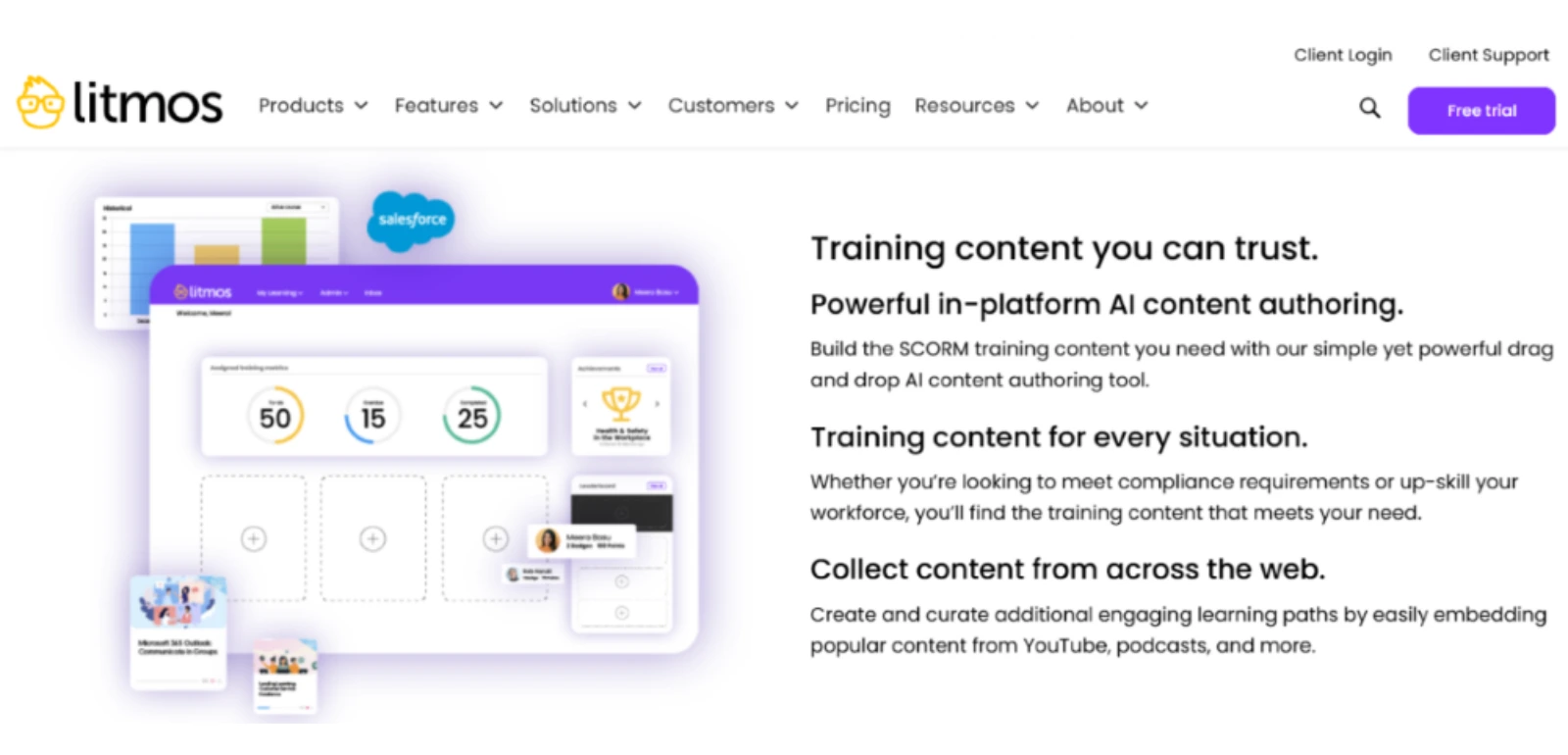
Litmos is a comprehensive platform and is one of the best learning management systems(LMS) in India focusing solely on corporate training and e-commerce. It provides features such as certifications, mobile learning, and integration with multiple business systems. Its AI software can help personalize learning pathways leading to greater engagement and learning results. Litmos also provides robust reporting to monitor learner activity. It is a flexible platform that can support organizations with ambitions to grow.
This learning platform supports the development of employees’ skills by providing a broad spectrum of learning assets that they can access wherever, whenever, and through any device. Trusted learning management systems (LMS) make employee training seamless and efficient.
Key Features:
- AI-driven personalized learning
- Third-party integrations
- Certificate and badge options
- Advanced analytics for monitoring performance
Pros:
- Mobile access for flexibility in learning opportunities
- Flexibility and scalability for most sizes of organizations
Cons:
- Cost-prohibitive for smaller organizations
- The steep learning curve for advanced features
- Customization may require technical expertise
Pricing:
- Foundation Suite: 140 courses.
- Premier Suite: includes content creation tools.
- Platinum Suite: includes advanced analytics; and unlimited support.
4. 360Learning
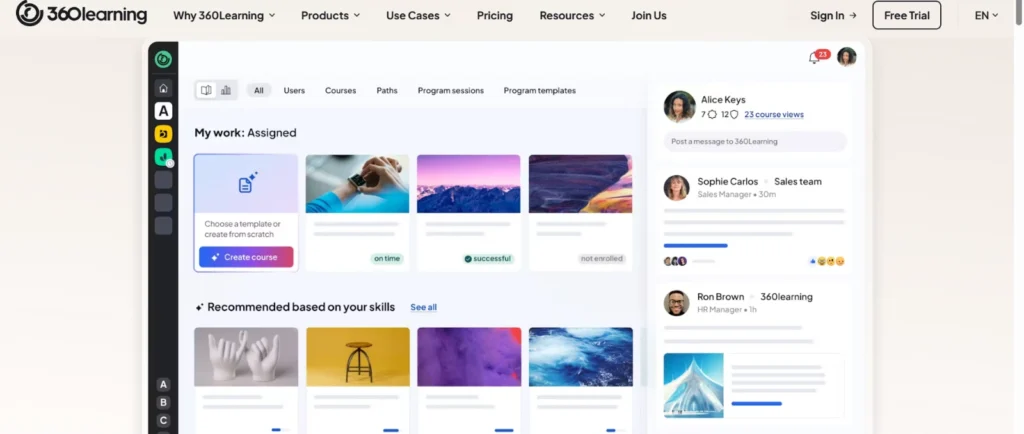
360Learning is the next platform in our rundown of the best learning management software that combines LXP and LMS with a strong focus on collaborative learning. It is especially well suited for organisations that and running both internal and external training. Plus, it harnesses AI to identify the skills gap in your team, for quick upskilling. It has a very powerful analytics feature and is very user-friendly with a nice, easy-to-navigate interface.
Employees can effectively lead their learning, and there is an underlying expectation that all will share their knowledge. It is a fast, efficient way to establish a community and create cross-functional upskilling across your organisation. Modern learning management systems (LMS) make this process seamless and trackable.
Key features :
- AI-powered skill gap analysis
- Collaboration authoring
- Certification included
- Compliance automation
Pros:
- Easy to use
- Robust data and analytics
- Allows expert-led academies
Cons:
- Can be too much for a small business
- The difficult learning curve for advanced tools
Pricing:
- Available on request costly pricing plans
5. Workday Learning Management
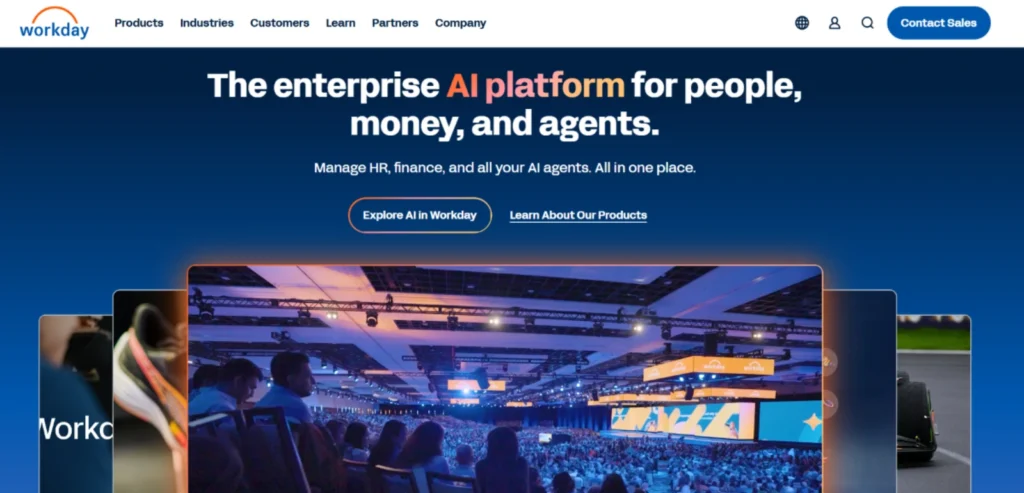
Workday is an HR and financial management software that encompasses an LMS as part of its package of services. Workday’s LMS offers functionality to develop simple courses that utilize documents and web links, manage and shared content, and learner progress can be monitored using analytics. Workday gives employees the ability to develop and modify their individual development plans that are developed to assist with career goals. It is a reliable choice among modern learning management systems (LMS).
Workday is a great choice for organizations looking for HR management with limited learning management systems (LMS) features, though it is not as robust as dedicated learning management systems (LMS) applications.
Key Features:
- Basic content creation and content management
- Learner analytics and reporting
- Individual development plans
Pros:
- HR and payroll tools are natively integrated
- Sharing content across employees
- Customizable learner analytics
Cons:
- Limited content creation
- Long to implement
- Only sold as a full HR suite
Pricing:
Starts from $22,000-$180,000 annually.
Suggested blogs to read:
- Best Smart Document Management Software
- Best Content Management Systems (CMS)
- Best AI for Market Research & Insights
6. Oracle Learning Management System
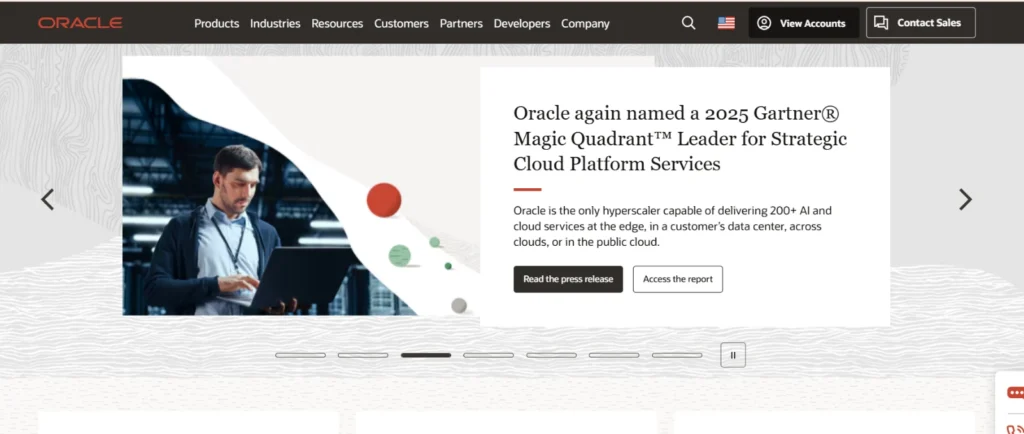
Oracle Learning Management is a fully functional learning management system included within Oracle’s Human Capital Management and Financials and Order Management solutions. The system enables organizations to build custom learning paths and interactive content with the ability to track user participation and their use all from the same application. It is one of the leading learning management systems (LMS) for enterprise training.
This flexibility makes Oracle Learning Management more adapted to the modern use of learning than existing learning management systems (LMS), useful to larger organizations that value continuous learning and the development of their talent.
The advanced reporting, compliance features, and employee-tailored learning paths allow for bespoke upskilling and development opportunities from Oracle Learning Management.
Key Features:
- Customizable learning paths
- Automated compliance and certification management
- Advanced reporting and analytics
- Integration with external content providers
Pros:
- Comprehensive learning and talent management
- Personalized learning paths
- Strong compliance tracking
Cons:
- Learning curve
- Requires support in customizing
- Small businesses may find it overwhelming
Pricing:
Available upon request
7. Zoho Learn
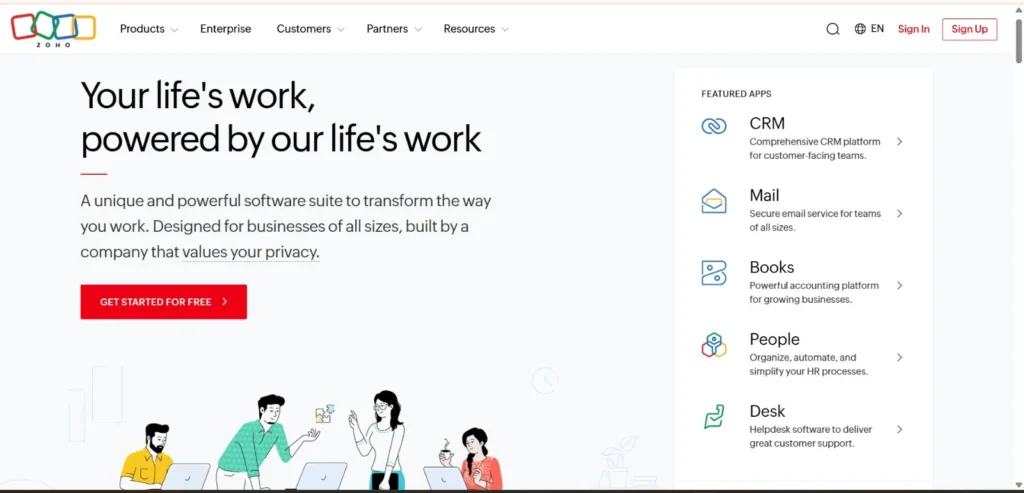
“Zoho Learns falls on the list of the best learning management systems (LMS) in India and is built for businesses to develop interactive online training experiences, test employee understanding, and measure the outcomes of training. The intuitive course builder enables users to create a variety of lessons, quizzes, and assignments to make learning interesting and interactive.
Powerful reporting tools are available to monitor learner progress, and the easy-to-use interface makes learning simple for employees. Zoho Learn can accommodate businesses of all sizes, delivering workplace training through flexible learning management systems (LMS) that are accessible on any device, including mobile.
Key Features:
- Course builder with drag-and-drop features
- Quiz, assignments and, certifications
- Mobile app for learning on-the-go
Pros:
- User-friendly interface
- Flexible options for building content
Cons:
- Less advanced features
- More complex administrative dashboard
- Complex initial setup
Pricing:
- Free
- Express: $1/user/month
- Professional. $3/user/month
8. Adobe Learning Manager
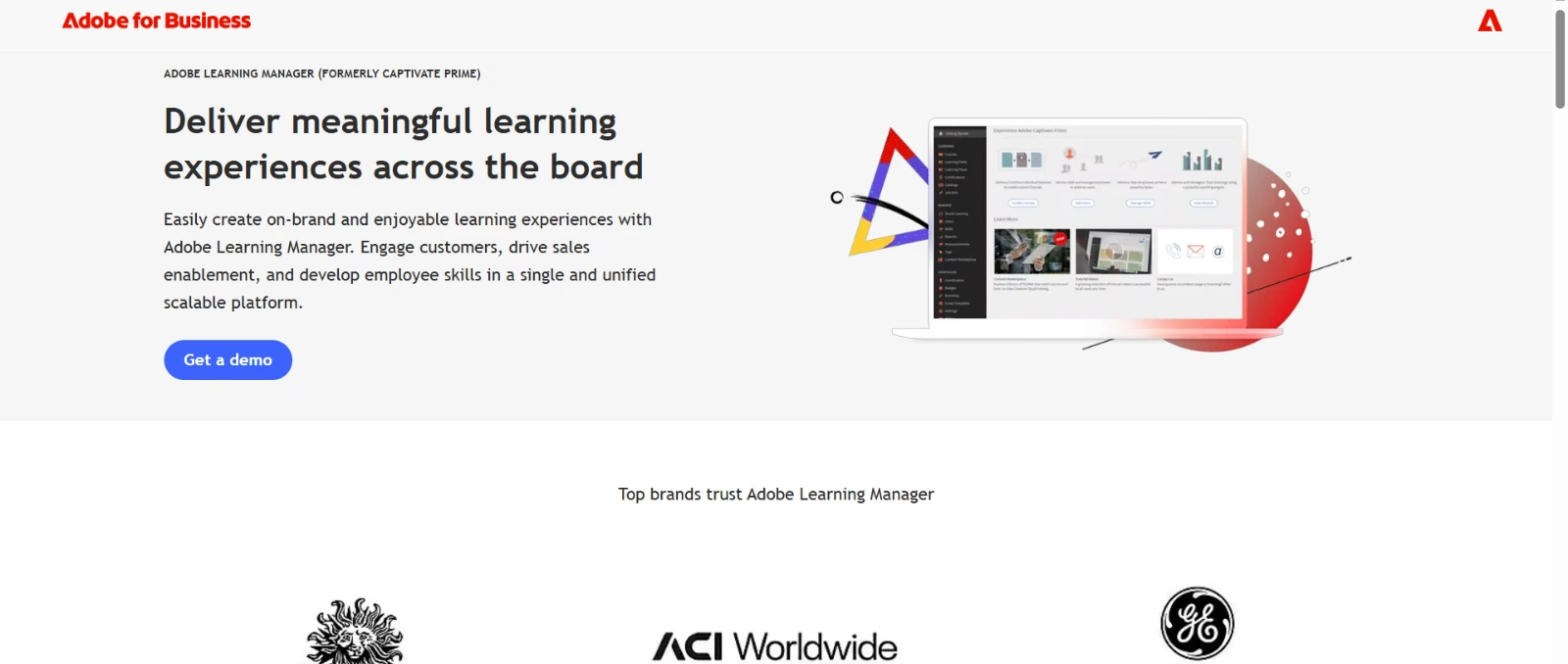
Another competitor for inclusion in our list of the best learning management systems (LMS) for training providers who want to create sophisticated, interactive learning experiences, is Adobe Learning Manager (used to be called Captivate). It gives you a lot of options for making programs with simulations, scenarios and multimedia, all of which reflect effective ways of engaging learners in programs.
It also has excellent gamification features – you can set the learners up to earn badges and certificates as they progress through the learning – and gives them a sense of motivation. It has personalised learning paths, which lets learners learn content depending on their performance – just like all other learners – without “dragging on”, making it an effective part of learning management systems (LMS) .
Key Features:
- Robust course authoring, including interactive content and simulations
- Individualized learning paths
- Excellent gamification options
Pros:
- Many options for interactive content
- Support for many different formats of content such as video, quizzes
Cons:
- Difficult navigation
- Premium features are very expensive
Pricing:
- starts at $4 per month
9. iSpring Learn
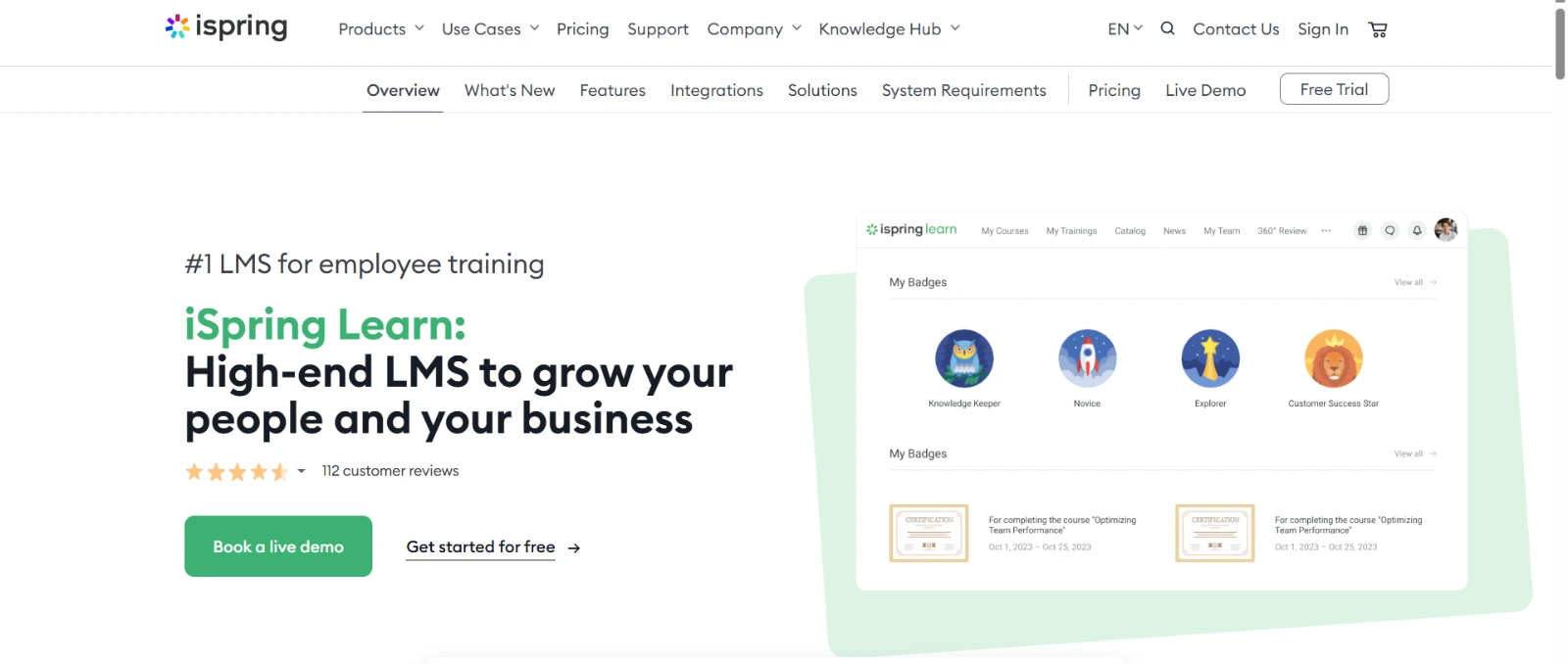
iSpring Learn is a comprehensive learning management system with a flexible pricing model making it a terrific option for large organizations.
The software is based in the cloud and offers unlimited storage options, but if you prefer the security of an on-premise installation, that is available. All of these features and functions make it an ideal choice for large enterprise companies using learning management systems (LMS).
Some of the more notable and attractive features of the platform include its options for increasing employee engagement in training programs. You can use colourful badges, game-like leaderboards, and gamification features in your training sessions.
Another useful feature is the direct messaging feature and a dedicated Q&A section for students and course developers to discuss or, at least, ask questions based on course content, making it an essential component of modern learning management systems (LMS).
Key features:
- Simple and Quick Course Creation
- Strong Reporting and Analytics on user Training
- Incorporates with iSpring Suite
- Some gamification features
Pros:
- Easy to use interface
- Good working integration with PowerPoint
- SCORM compliant and mobile friendly
- Good reporting and analytics
- Good customer support
Cons:
- Limited amount of customization
- Only available advanced features for premium plans
- Limited amount of gamification
- User management can create a limitation for larger enterprise clients
Pricing:
- Suite: $770/ year
- Suite Max: $970/ year
- Suite Premium: $1970/year
10. Docebo LMS
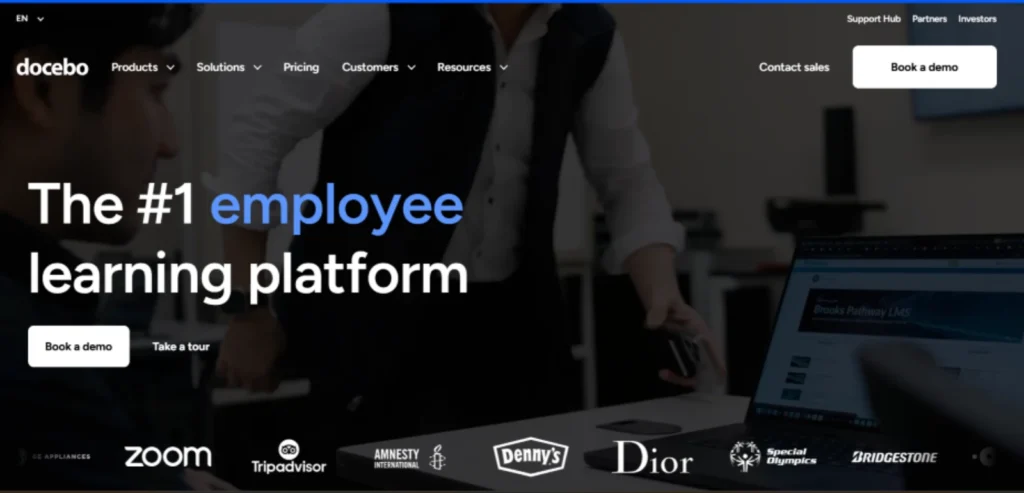
Docebo LMS is a scalable, AI learning management system that is designed for businesses of all sizes. It is fully featured allowing eCommerce, product bundling and personalized learning paths making it a flexible LMS for businesses with complex training requirements, especially in India. Docebo provides a framework for simplifying employee training and compliance with a single authoring and distribution platform that may suit your needs across a variety of industries.
Docebo can be used effectively, especially in large organizations in India that need flexible and scalable learning management systems (LMS). Docebo’s AI capabilities allow for personalized learning paths, providing the flexibility to ensure the training is tailored to the specific needs of each employee while maintaining compliance and cost-effectiveness.
Docebo eCommerce feature allows course selling capability, especially if your organization will be selling training programs and endorsing paid training programs. Docebo allows you to go further than just traditional learning and training. offering advanced learning management systems (LMS) features. Docebo provides advanced features for both small, and medium-sized businesses, and large enterprises in India with plenty of options for flexibility, ease of use, and scalability.
Docebo is the right system for businesses that are looking for an AI learning management system with advanced features like gamification, product bundling and detailed analytics. Docebo is an ideal learning management system for large organizations in India that requires a full-spectrum approach to training, compliance and sales management.
Key Features:
- AI Based learning paths and recommendations
- Courses can be bundled and sold through eCommerce features
- Integration with video conferencing for live sessions
- Detailed reporting and analytics
- Gamification features to increase engagement
Pros:
- AI powered features leading to a personalized education experience
- Enormously scalable for every size of business
- Great features for eCommerce and product bundling
- Excellent integration with video conferencing
- Great reporting and analytics features
Cons:
- Possibly too expensive for small businesses
- Initial setup for a new user may become complicated if they don’t have technical support
Pricing:
Free trial, contact for additional paid options
Things to think about when buying the best LMS for India
Consider these steps to help you purchase an LMS:
1. Identify what your institute requires: Before you buy an LMS, you need to discover what your organization’s requirements are, like the types of student content you will be providing, the total number of students, and any additional features that may be necessary.
2. Develop a budget: Allow for the learning management systems (LMS) budget, as well as any ongoing costs: license fees, support and maintenance fees, and any other associated costs.
3. Research LMS systems: Research learning management systems (LMS) and compare for features, functions, and budget.
4. Consider a user-friendly interface: Choose an LMS that is easy to use, both for teachers and students. Look at user interface options, accessibility, and mobile compatibility.
5. Check compatibility: Check learning management systems (LMS) compatibility with any other relevant tools for your organization such as, your content management system, student information system, or other documents, software, and systems.
6. Assessment of technical support: Choose an LMS that provides reliable and trustworthy technical support, which could include documentation, staff training, and technical assistance.
In Conclusion
The digital-first business world requires every business to have a good LMS (learning management system) to structure training and development. What is the priority when selecting Learning management software in India? Firstly, you need to identify the needs of your business. Then, it will be about comparing features and advantages and disadvantages on different platforms.
Learning management systems (LMS) will help you create and organize courses, share learning materials, and enhance engagement because all these programs were shown to have positive effects on the growth of your team and, therefore, the success of your business when accompanied by the right education.
FAQs
1. Is it possible to customize an LMS to meet my organization’s needs?
Yes, most learning management systems (LMS) have customization options to allow you to configure the LMS to work with your organization’s needs. You will be able to customize course contents, branding, user roles, integrations with other tools, and more to ensure the effective implementation of an LMS in your organization.
2. How can I ensure data security and privacy using an LMS?
Pick an LMS that meets your industry’s needs and is compliant with industry regulations. Look for security features – ie. data encryption, secured user identification, and regular security updates and improvements – to help protect the sensitive nature of the information stored.
3.What type of support values will I get from an LMS provider?
The supports will be different from provider to provider; however, choose learning management systems (LMS)with a strong enough support system to assist you with any technological challenges, and to train and support your administrators and users.
